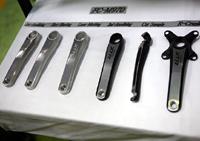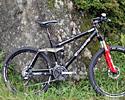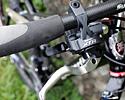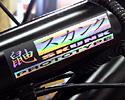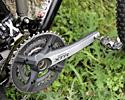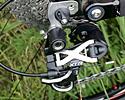
Recently on Cyclingnews.com |
First Impressions: Shimano XTR M970, July 25, 2006, part 1Falling (literally) for Shimano's new groupThe introduction of Shimano's new M970 XTR has, so far, consisted primarily of official press releases, rumor, and the occasional sighting and/or brief test ride of a so-equipped pro bike. Those days have past as Shimano invites James Huang to their Japanese headquarters to ride the new gear in their home arena.
"Shimano M970 XTR". Picture those letters in large-scale blinking neon on Times Square marquis and that about sums up the hype surrounding Shimano's most significant off-road offering in years. Up until now, though, hype is all it's been as the theatre doors have been shut while the cast prepared inside. Shimano has a lot riding on this fourth installment of the XTR series, particularly as the dark gray mid-90s version was an undisputed blockbuster, but its sequel was somewhat of a letdown.
After a fairly lengthy wait, the stage has finally been set and the curtains have been pulled, and this particular viewing is a rather special one. While it's fairly typical for media to get first crack at new gear, the usual routine consists of opening up a package (Christmas arrives often around these parts), bolting on some gear, and heading out to some local test grounds. In this case, Shimano invited five North American journalists directly to its headquarters in Osaka during Japan's rainy season in late June for the first showing. Not only were we to ride the new group on Shimano's home turf, but a slew of engineers were on-hand to assist us in installing the components on our own frames. "Controlled falling" in Japan
With kit installed and bikes loaded up into a fleet of Shimano company minivans, the time came to hit the trails as we headed into the mountains to ride the fabled Kumano trail. The Kumano is a 1300 year old footpath running through the steep and heavily wooded terrain of the Kii peninsula on Japan's main island of Honshu. Long ago, the ancient road was heavily used by pilgrims making their way from Kyoto to Kumano. Today, thick and slippery moss and lichens have taken over the endless stretches of massive hand-laid stone steps that were once kept clean by foot traffic, and the nearly 100 small shrines, known as Oji, that line the route are now the Kumano trail's most frequent user. To be frank, this was not the ideal testing ground. Uphills consisted almost exclusively of ridiculously slippery hike-a-bike, and downhills were as much an exercise in faith as anything else as we were sent careening from rock to rock with nary a safe runout in sight. When all was said and done, the final tally was a solid four hours of "riding" time to cover a mere 15 kilometers. Serious kudos belongs to the Kumano faithful that made the journey on foot back in the day (although that may have been easier!). Thankfully, the following day's riding proved to be much more reasonable and allowed to use more of the group's features (um, like shifting). So how'd it go?Human pain and suffering aside, our host's testing grounds definitely provided more than ample opportunity to put the new M970 kit through the proverbial wringer, and having Shimano's engineers on hand during the installation process to answer questions and provide assistance was certainly a nice touch. Here's what we thought: Shifting
Shimano's controversial Dual Control integrated levers and traditional Rapidfire trigger shifters both receive fairly equal billing for M970 and our little gathering was split nearly 50/50 with three journalists going with the trigger option and two of us on Dual Control. Admittedly, the first-generation Dual Control was not entirely to my liking, but I decided to give it another go after sampling its improvements during this year's Sea Otter Classic. Oh, how things have changed. I'll go out on a limb here and say that my previous opinions on Dual Control may have been different had this generation been introduced first. Time will tell how I feel about the system over the long-term, but the performance of Dual Control has been improved to the point where the differences between the two styles of shifting are now more a matter of personal preference than functionality. First off, the ergonomics of the new system have been greatly enhanced over M960. The levers are offset upwards just a hair to facilitate shifting with the backs of your fingers, and the motion seems a bit more natural with the new pivot placement. Shimano's "Light Action" edict is still in effect here: upward movements require an impressively low amount of effort (maybe too little for some) and are also easier to initiate than before. Front shifting, in particular, is dramatically easier. In spite of the low effort, shifting precision was spot-on during our trip, and no adjustments were needed post setup. Shimano also says that M970 is more tolerant of cable maladjustment than previous iterations but it was a bit unclear as to how that goal was achieved (cable pull ratio remains unchanged).
Shimano still recommends pairing Dual Control with its Low Normal rear derailleur and that's how we rolled in Japan. The newfound ability to shift two gears with one upwards lever movement makes the recommendation easier to swallow as the rider can now dump gears twice as quickly as before in the event of a sudden change of pitch skywards. In addition, the Low Normal configuration allegedly results in much improved drivetrain life, a point which Shimano admits it should have emphasized a bit more when the concept was introduced several years ago. High Normal derailleurs are suggested for the new trigger shifters. We didn't ride the triggers at any length on this occasion, but quick "parking lot" cruises confirmed our experience at Sea Otter. The new shifters offer a more precise feel, plus lots of very welcome tactile and audible feedback. The flexible release trigger actuation and moveable pod position should satisfy most users, and Multi Release makes it much easier to quickly move across cassette (only two pushes/pulls are needed to shift four gears). We'll report more once we get a set for more in-depth testing but early indications continue to be overwhelmingly positive. Drivetrain
The M970 XTR crankset abandons the current generation's pinch-bolt setup in favor of a more secure splined interference fit similar to later Octalink arrangements. The more solid attachment should be stiffer than the current pinch-bolt arrangement and may eliminate some user error during installation as the large alloy mounting bolt is simply tightened down until the crank head bottoms out on the spindle. Bearing adjustment is accomplished with a threaded collar whose setting is locked in place with a small pinch bolt, similar to what Campy does with its hubs. Interestingly, Shimano has switched to Torx head fittings on its new alloy chainring bolts. Unfortunately, the built-in one-key release of M950 has been abandoned to shave a few grams (and apparently has some future development implications but Shimano would not elaborate), so a separate bespoke tool is required to remove the arm. Thankfully, M970 at least uses the same Hollowtech II bottom bracket as before and, as with its other XTR launches, Shimano will include the bearing adjusting collar tool and crank puller bit with the first few sets of components. The new setup is 28g lighter than M960, which was already no slouch in the weight department, plus offers a cleaner overall appearance. Speaking of appearance, the polished and clear anodized outer surface of the new crankset looks fantastic in person and should definitely stay looking newer longer, particularly for those duck-footed pedalers out there.
Is the new crankset stiffer? Maybe, but any comments on the differences in overall rigidity would be subjective at best for now. We also can't comment on the durability of the new titanium and carbon middle ring empirically (yet), but shift quality across the board was impeccable. Any fears that the conventional chainring spider arrangement would be a functional step backwards from M960 are unfounded as the new rings are admirably rigid and shift well, especially under load. Bearing durability is also an unknown for now, but the new style of bearing adjustment does seem to produce a smoother running bottom bracket, if only because the new setup makes it more difficult to overtighten the bearings. Shimano has reverted back to multiple spider assemblies for the M970 cassette, but unlike the first generation M950 nine-speed stuff, the individual spiders now interlock somewhat to provide reinforcement for adjoining sections. The new configuration sheds a few grams, but a side benefit is enhanced shifting performance imparted by the additional rigidity. When shifting under heavy load, the larger titanium cogs on the M970 cassette are less likely to flex, either temporarily or permanently, and shifting on our rides was noticeably crisper and faster. The new XTR pedals aren't groundbreaking in any way, but the SPD-faithful will still have reasons to upgrade. The stainless steel axle of the M959 pedal is now fully hollow and the pedal body has been shaved a bit to yield nearly 40g of weight savings without compromising functionality. Entry was smooth and positive, as was the release once things broke in a bit. In part two: Brakes, wheels, and the new, listening Shimano PhotographyFor a thumbnail gallery of these images, click here Images by James Huang/Cyclingnews
|

